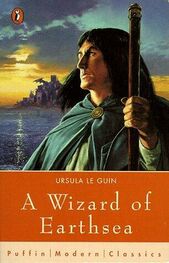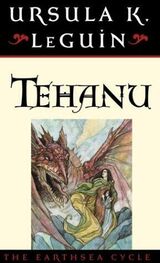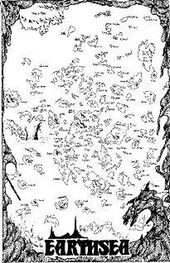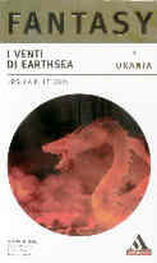The true name of a person is a word in the True Speech. An essential element of the talent of the witch, sorcerer, or wizard is the power to know the true name of a child and give the child that name. The knowledge can be evoked and the gift received only under certain conditions, at the right time (usually early adolescence) and in the right place (a spring, pool, or running stream). Since the name of the person is the person, in the most literal and absolute sense, anyone who
knows it has real power, power of life and death, over the person. Often a true name is never known to anybody but the giver and to the owner, who both keep it secret all their life. The power to give the true name and the imperative to keep it secret are one. True names have been betrayed, but never by the name giver.
Some people of great innate and trained power are able to find out the true name of another, or even to have it come to them unsought. Since such knowledge can be betrayed or misused, it is immensely dangerous. Ordinary people-and dragons-keep their true name secret; wizards hide and defend theirs with spells. Morred could not even begin to fight his Enemy until he saw his Enemy's name written in the dust by the falling rain. Ged could force the dragon Yevaud to obey him, having by both wizardry and scholarship discovered Yevaud's true name under centuries of false ones.
Magic was a wild talent before the time of Morred, who as both king and mage established intellectual and moral discipline for the art magic, gathering wizards to work together at the court for the general good and to study the ethical bases and constraints of their practice.
This harmony generally prevailed through the reign of Maharion. In the Dark Time, with no control over wizardly powers and widespread misuse of them, magic came into general disrepute.
THE SCHOOL ON ROKE
The school was founded in about 650, as described above. The Nine Masters or master-teachers of Roke were originally:
Windkey, master of the spells controlling weather
Hand, master of all illusions
Herbal, master of the arts of healing
Changer, master of the spells that transform matter and bodies
Summoner, master of the spells that call the spirits of the living and the dead Namer, master of the knowledge of the True Speech
Patterner, dweller in the Immanent Grove, master of meaning and intent Finder, master of the spells of finding, binding, and returning Doorkeeper, master of the entering and leaving of the Great House
The first Archmage, Halkel, abolished the title of Finder, replacing it with Chanter. The Chanter's task is the preservation and teaching of all the oral deeds, lays, songs, etc., and the sung spells.
The original loose, roughly descriptive use of the words witch, sorcerer, wizard, was codified into a strict hierarchy by Halkel. Under his rules:
Witchery was restricted to women. All magic practiced by women was called "base craft," even when it included practices otherwise called "high arts," such as healing, chanting, changing, etc. Witches were to learn only from one another or from sorcerers. They were forbidden to enter Roke School, and Halkel discouraged wizards from teaching women anything at all. He specifically forbade the teaching of any word of the True Speech to women, and though this proscription was widely ignored, it led in the long run to a profound, long-lasting loss of knowledge and power among the women who practiced magic.
Sorcery was practiced by men-its only real distinction from witchery. Sorcerers trained one another, and had some knowledge of the True Speech. Sorcery included both base crafts as defined by Halkel (finding, mending, dowsing, animal healing, etc.) and some high arts (human healing, chanting, weatherworking). A student who showed a gift for sorcery and was sent to Roke for training would first study the high arts of sorcery, and if successful in them might pursue his training in the art magic, especially in naming, summoning, and patterning, and so become a wizard.
A wizard, as Halkel defined the term, was a man who received his staff from a teacher, himself a wizard, who had taken special responsibility for his training. It was usually the Archmage who gave a student his staff and made him wizard. This kind of teaching and succession occurred elsewhere than Roke-notably on Paln-but the Masters of Roke came to regard with suspicion a student of anyone not trained on Roke.
Mage remained an essentially undefined term: a wizard of great power.
The name and office of archmage were invented by Halkel, and the Archmage of Roke was a tenth Master, never counted among the Nine. A vital ethical and intellectual force, the archmage also exerted considerable political power. On the whole this power was used benevolently. Maintaining Roke as a strong centralising, normalising, pacific element in Archipelagan society, the archmages sent out sorcerers and wizards trained to understand the ethical practice of magic and to protect communities from drought, plague, invaders, dragons, and the unscrupulous use of their art.
Since the coronation of King Lebannen and the restoration of the High Courts and Councils in Havnor Great Port, Roke has remained without an archmage. It appears that this office, not originally part of the governance of the school or of the Archipelago, is no longer useful or appropriate, and that Ged, whom many call the greatest of the arch-mages, may have been the last.
CELIBACY AND WIZARDRY
Roke School was founded by both men and women, and both men and women taught and learned there during its first decades; but since during the Dark Time women, witchery, and the Old Powers had all come to be considered unclean, the belief was already widespread that men must prepare themselves to work "high magic" by scrupulously avoiding "base spells," "Earthlore," and women. A man unwilling to put himself under the iron control of a spell of chastity could never practice the high arts. He could be no more than a common sorcerer. Male wizards thus had come to avoid women, refusing to teach them or learn from them. Witches, who almost universally went on working magic without giving up their sexuality, were described by celibate men as temptresses, unclean, defiling, essentially wicked.
When in 730 the first Archmage of Roke, Halkel of Way, excluded women from the school, among his Nine Masters only the Patterner and the Doorkeeper protested; they were overruled. For more than three centuries, no woman taught or studied at the school on Roke. During those centuries, wizardry was an honored art, conferring status and power, while witchery was an unclean and ignorant superstition, practiced by women, paid for by peasants.
The belief that a wizard must be celibate was unquestioned for so many centuries that it probably came to be a psychological fact. Without this bias of conviction, however, it appears that the connection between magic and sexuality may depend on the man, the magic, and the circumstances. There is no doubt that so great a mage as Morred was a husband and father.
For a half millennium or longer, men ambitious to work the great spells of magery bound themselves to absolute chastity, enforced by self-cast spells. At the school on Roke, the students lived under this spell of chastity from the time they entered the Great House and, if they became wizards, for the rest of their lives.
Among sorcerers, few are strictly celibate, and many marry and bring up a family.
Women who work magic may practice periods of celibacy as well as fasting and other disciplines believed to purify and concentrate power; but most witches lead active sexual lives, having more freedom than most village women and less need to fear abuse. Many pledge "witch-troth" with another witch or an ordinary woman. They do not often marry men, and if they do, they are likely to choose a sorcerer.





